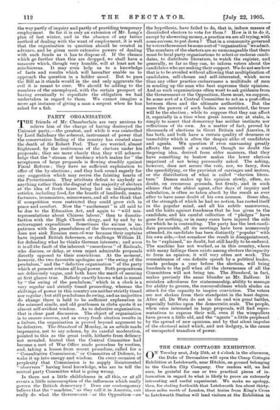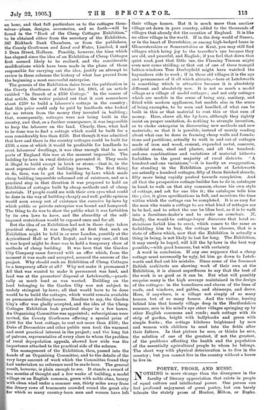THE CHEAP COTTAGES EXHIBITION.
ON Tuesday next, July 25th, at 4 o'clock in the afternoon, the Duke of Devonshire will open the Cheap Cottages Exhibition at Letchworth, near Hitchin, on ground belonging to the Garden City Company. Our readers will, we feel sure, be grateful for one or two practical pieces of in- formation in regard to what is likely to prove an extremely interesting and useful experiment. We make no apology, then, for stating forthwith that Letchworth lies about thirty- three miles north of London, that ,trains from King's Cross to Letchworth Station will land visitors at the Exhibition in
an hour, and that full particulars as to the cottages them- selves—plans, designs, accessories, and so forth—will be found in the "Book of the Cheap Cottages Exhibition," to be obtained either from the secretary of the Exhibition, 347 Birkbeck Bank Chambers, or from the publishers, the County Gentleman and Land and Water, Limited, 4 and 5 Dean Street, Holborn. Possibly, however, the time which has elapsed since the idea of an Exhibition of Cheap Cottages first seemed likely to be realised, and the considerable Modifications which have been made in the plans of those responsible for carrying out the idea, justify an attempt to review in these columns the history of what has proved from the beginning a most successful enterprise.
The genesis of the Exhibition dates from the publication in the County Gentleman of October 1st, 1901, of an article entitled "In Search of a £150 Cottage." In the course of that article, the writer pointed out that it cost somewhere about £250 to build a labourer's cottage in the country ; that this price could only be paid by landlords who looked for no return from the money they invested in building ; that, consequently, cottages were not being built in the country, and that, as a further consequence, it was impossible to keep the labourer on the land. Clearly, then, what had to be done was to find a cottage which could be built for a sum considerably less than £250. But though it was admitted that here and there in the country cottages could be built for £150, a sum at which it would be profitable for landlords to erect labourers' dwellings, it was clear enough that in most parts of England this was at the moment impossible. The building by-laws in rural districts prevented it. Tbey made it illegal to build except in brick or stone,—that is, in the most expensive style of building known. The first thing to do, then, was to get the building by-laws which made cheap building impossible reformed out of existence, and as a practical step in that direction it was proposed to hold an Exhibition of cottages built by cheap methods and of cheap materials. If people could see with their own eyes what could be done in the way of building cheaply and well, public opinion would soon sweep out of existence the coercive by-laws by which public or private enterprise was bound and hampered. The thing to do was to show the public what it was forbidden by its own laws to have, and the absurdity of the self- imposed restrictions would be exposed once and for all.
But the idea of an Exhibition had not in those days taken practical shape. It was thought at first that such an Exhibition might be held in or near London, possibly at the Agricultural Hall or Park Royal; and in any case, all that it was hoped might be done was to hold a. temporary show of methods of cheap building. It was here that the Garden City Company came forward with an offer which, from the moment it was made and accepted, assured the success of the project. Why should such an Exhibition of Cheap Cottages be a temporary affair at all ? Why not make it permanent ? All that was wanted to make it permanent was land, and land was at the promoters' disposal at Letchworth,—practi- cally as much land as was wanted. Building on the land belonging to* the Garden City was not subject to unduly stringent by-laws ; all that would have to be done would be to build the cottages, which would remain available as permanent dwelling-houses. Needlesi to say, the Garden City's offer was gladly accepted, and the idea of the Cheap Cottages Exhibition took practical shape in n few hours. An Organising Committee was appointed; subscriptions were invited, the County Gentleman offering a special prize of £100 for the best cottage, to cost not more than £150; the Duke of Devonshire and other public men took the warmest and most practical interest in the project ; and the long list of patrons, representative of every class to whom the problem of rural depopulation appeals, showed how wide was the importance attached to the practical side of the scheme.
The management of the Exhibition, then, passed into the hands of an Organising Committee, and to the details of the very large amount of work which the Committee found they had'undertaken no reference need be made here. The general -result, however, is plain enough to see. It stands a record of ten menthe of thought and a few weeks of building, a model village on an English common, green with noble elms, breezy with clean wind under a summer sun, thirty miles away froin the dreary rows of tenements crowded round the great city for which "so many country-born. men and women have left
their village homes. But it is much more than another village set down in pure country, added to the thousands of villages that already dot the counties of England. It is like no other village in the world. If in the deep weald of Sussex, or in the heart of Dorsetahire, or among high-hedged lanes in Gloucestershire or Somersetshire or Kent, you may still find villages which bring joy to the traveller's eye because they are old, and peaceful, and English ; if you feel that down that quiet road, past that little inn, the Flaming Tinman might even now come striding, or that out of one of these tranquil lattice-windows Tess Durbeyfield might have watched the haymakers ride to work ; if in these old villages it is the age and permanence of it all which attracts,—here at Letchworth is something which is attractive because it is absolutely different and absolutely new. It is not so much a model village as a village of model cottages ; and not only cottages which are models in the sense of being airy, sanitary, and fitted with modern appliances, but models also in the sense of being examples, to be seen and handled, of what can be built in this or that material to cost this or that sum of money. Here, above all, the by-laws, although they rightly insist on proper sanitation, do nothing to strangle invention, or to choke enterprise in discovering new methods and new materials ; so that it is possible, instead of merely reading about what can be done in framing cheap walls and founda- tions and partitions, actually to walk in and out of cottages made of iron and wood, cement, expanded metal, concrete, artificial stone, steel and plaster, and all the hundred- and-one combinations and variations of material hitherto forbidden in the great majority of rural districts. " A hundred-and-one variations,"—it is hardly an exaggeration, for standing in the Exhibition grounds at Letchworth are actually a hundred cottages, fifty of them finished already, fifty more being rapidly pushed towards completion. And all that the prospective cottage-builder has to do is, catalogue in hand, to walk on that airy common, choose his own style of cottage, and ask for one like it; the catalogue tells him the I rice, it gives specifications in full, and mentions the time within which the cottage can be completed. It is as easy for the man who wants a cottage to see what kind of cottages are to be had, and to select the one he likes best, as it is to walk into a furniture-dealer's and to order an armchair. 14, finally, the would-be cottage-buyer discovers that local re- strictions forbid him to erect, which comes to the same as forbidding him to buy, the cottage he chooses, that is a state of affairs which, now that the Exhibition is actually a thing in being, is not likely to last for long. The Exhibition, it may surely be hoped, will kill the by-laws in the best way possible,—with good humour, but with certainty.
A word in conclusion. If any one supposes that a cheap cottage must necessarily be ugly, let him go down to Letch- worth and find out his mistake. Since some of the foremost British architects are showing work of their own at the Eihibition, it is almost superfluous to say that the best of the work is as good as it can be. But what will possibly surprise many is the high average maintained in the design of the cottages : in the homeliness and charm of the lines of roofs, and windows, and gables, and chimneys, and doors. Here, if anywhere, is a village not simply of so many houses, but of so many homes. And the visitor, leaving behind Lim that homely village deep in the Hertfordshire summer, sees in his mind's eye other villages springing up by other English commons and roads; each cottage with its strip of garden, bright with hollyhocks and green with simple fruits ; the cottage kitchens brightened by men and women with children to send into the fields after their fathers. In that picture he sees, or thinks he sees, the solution of one of the greatest, if not the greatest, of the problems affecting the health and the population of the essentially agricultural people to whom he belongs. The short way with physical deterioration is to live in the country ; but you cannot live in the country without a house to live in.
POETRY, PROSE, AND MUSIC.



































 Previous page
Previous page